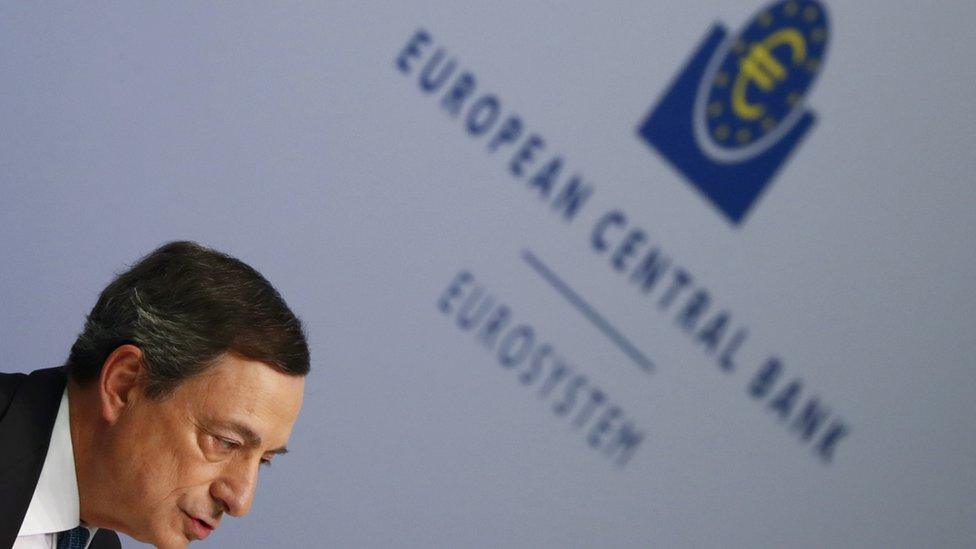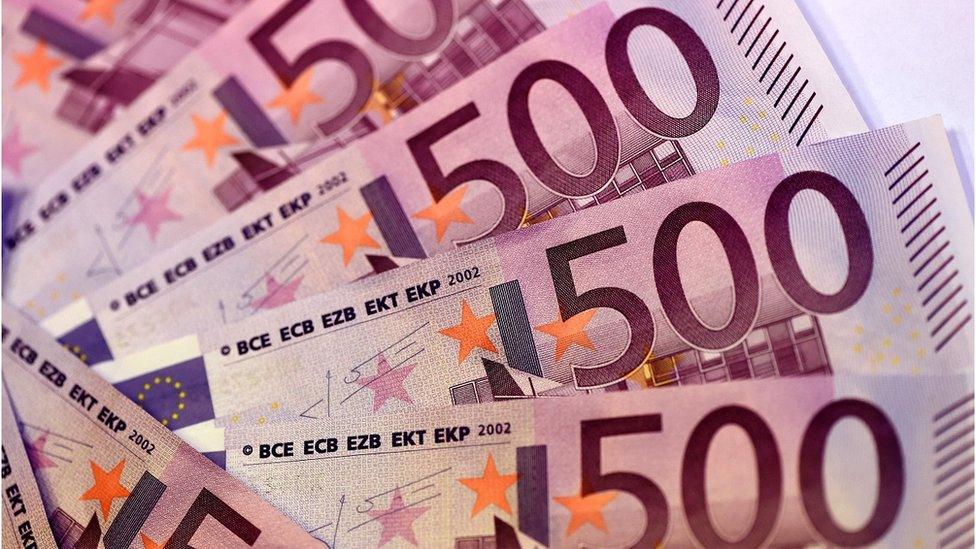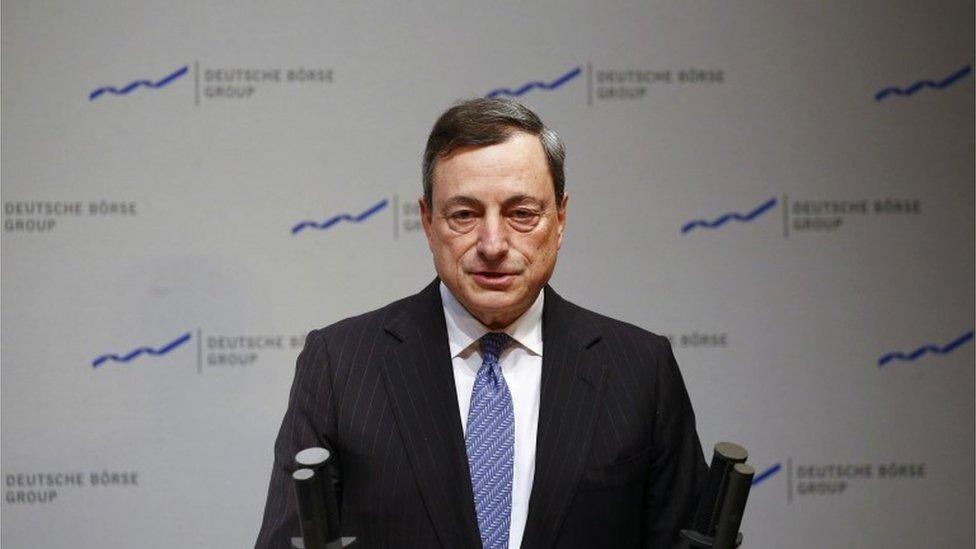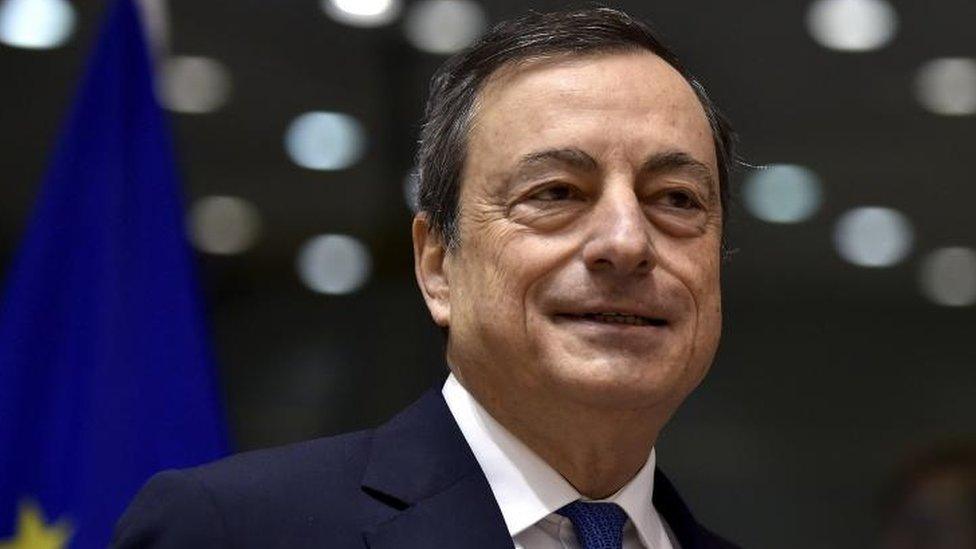ECB stimulus surprise sends stock markets sliding
- Published

European stock markets have fallen and the euro has soared following the economic stimulus measures announced by the European Central Bank.
After initially rising following the broader than expected package, Frankfurt closed down 2.3%, Paris ended 1.7% lower and the FTSE 100 slid 1.8%.
The euro initially fell 1.6% against the US dollar to $1.0822 before jumping as high as $1.1218.
It was one of the biggest one-day swings in the currency's history.
Sharp rises for European banks were also largely wiped out.
The ECB cut its main interest rate from 0.05% to 0% and cut its bank deposit rate, from minus 0.3% to minus 0.4%.
The bank will also expand its quantitative easing programme from €60bn to €80bn a month.
Jasper Lawler, of CMC Markets, said: "Stocks came off highs of the day when some of the initial euphoria was nullified by the suggestion by ECB president Mario Draghi that rates would not be cut any further."
Simon Derrick, chief currency strategist at BNY Mellon: "If the intention of the ECB board was to help weaken the euro then their work was entirely undone by Mr Draghi's comments about the future path of rates."
John Hardy, head of currency strategy at Saxo Bank, said: "This was a much bigger bazooka than the market was expecting and shows the ECB trying to get ahead of the confidence curve after learning its lesson in December."
The stimulus measures announced three months ago have largely failed to drive economic growth higher or boost inflation.
Inflation alert
Mr Draghi told a news conference in Frankfurt that the bank had cut eurozone inflation projections, external to reflect the recent decline in oil prices.
The bank now expected inflation to be just 0.1% this year - substantially lower than the previous estimate of 1% and underlining the need for the ECB to go further than expected.
Inflation should rise to 1.3% in 2017 and 1.6% the following year, according to its estimates.
"We are not in deflation," Mr Draghi stressed.
He also warned that risks to economic growth across the 19 countries that use the euro remained "tilted to the downside".

The ECB cut its growth forecasts to an increase of 1.4% this year - down from 1.7%; 1.7% for 2017 - down from 1.9%; and 1.8% for 2018.
The governing council expected the bank's key interest rates "to remain at present or lower levels for an extended period of time, and well past the horizon of our net asset purchases".
The bond-buying programme will continue at least until the end of March 2017.
As well as government debt, the bank will now be allowed to use its newly printed money to buy bonds issued by companies as well. That scheme will start towards the end of the second quarter this year.
The market for the European investment-grade corporate bond market is worth about €800bn, according to UBS analysts.
"The devil is in the detail of what will be included in the corporate bond purchases, and right now that presents more questions than answers," one analyst said.

Analysis: Kamal Ahmed, economics editor
Mario Draghi will now be watching to see if the ECB's actions have any effect on economic growth.
If they don't, the central bank has a major problem. As do the major European economies, held in a deflationary spiral by slowing growth, low global demand and crumbling commodity prices.
Once you have fired the bazooka, you had better hope it has the desired effect.

Laith Khalaf, senior analyst at Hargreaves Lansdown, said the ECB was now "plumbing the depths of monetary policy in a bid to stave off the encroaching threat of sustained deflation in Europe".
"It's hard to see even lower rates and more QE in Europe as a positive development. The fact the ECB is still pursuing such extreme monetary policy paints a depressing picture of the European economy, and markets are beginning to question what central banks have left in the locker if the global economy slips back towards recession," he said.
- Published10 March 2016
- Published25 January 2016

- Published21 January 2016
